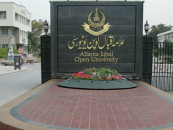Headcount: CCI likely to decide new census strategy
Fresh census has not been held for past 17 years.

Fresh census has not been held for past 17 years. PHOTO: FILE
The Council of Common Interests (CCI), the highest decision-making forum between the federation and federating units of Pakistan, is likely to decide a strategy for holding a fresh population headcount in the country.
A CCI meeting is scheduled to be held on Monday in which it will review the status of the implementation of decisions taken by the forum in the past besides other items on the agenda.
While conducting a population census after every 10 years is a constitutional obligation, the last census was held in 1998. Back in 2010, the CCI had decided to go for a population census in 2011 but the decision could not be implemented by the previous PPP government.
During the last government’s tenure, house listing – which is a component of the population census – was completed in 2011. But the exercise of population census was delayed on one pretext or the other.
Headed by the prime minister, the CCI, which is scheduled to meet after a delay of around six months, does not have the issue of population census formally on its agenda, according to an official of the ministry concerned.
“We have an item titled ‘review of the implementation of CCI decisions’. It [the census] is one of the issues that remain to be implemented and might be taken up as such,” the official said.
Holding of the CCI meeting after such a long time is itself violation of the Constitution, as under article 154, it must converge once in three months.
A few months ago, Nawaz Sharif had approved the census plan. Since electoral rolls in the country are updated each time on the basis of the last census, the ECP wants to carry out the much needed delimitation of constituencies for the national and provincial assemblies before the next general election is due in 2018.
The first census in Pakistan was conducted in 1951, the second in 1961, and the third in 1972 instead of 1971 due to political turmoil. The fourth census was held in March 1981 and fifth, which was due in 1991, was conducted in March 1998.
The census is deemed to be one of the most basic elements for the judicious distribution of resources, representation in parliament, electoral processes, tax collection and other civic issues including growing urbanisation and evaluation of resources for infrastructure development.
Parliamentary Secretary for Finance Sajjadul Hassan told the National Assembly recently that the government was serious about completing the exercise since the retrieved data provides benchmarks for socio-economic development plans and administrative activities. It also provides the basis for political representation, equitable distribution of public funds to federating units and quota for all civil positions in the federal government.
Published in The Express Tribune, February 10th, 2014.



















COMMENTS
Comments are moderated and generally will be posted if they are on-topic and not abusive.
For more information, please see our Comments FAQ